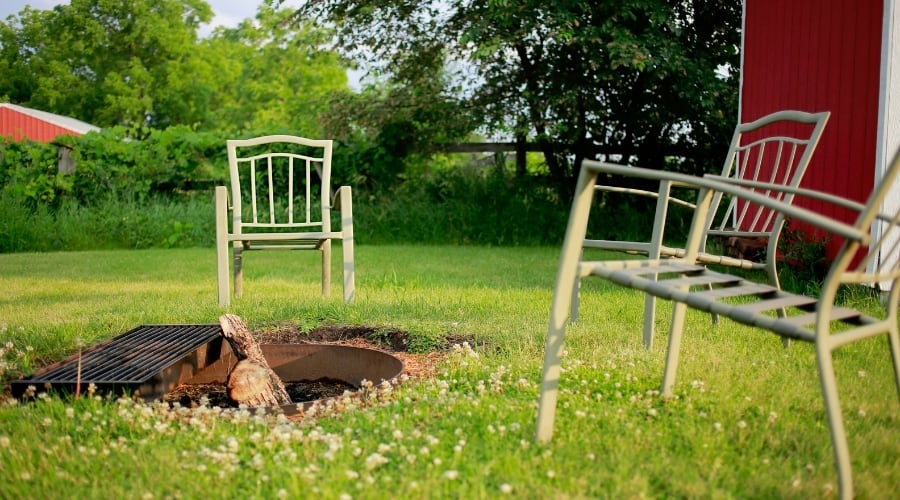The gasses produced naturally by a septic tank are colorless, corrosive, and flammable. Fortunately, since septic systems are buried underground, they are generally pretty fireproof, but that doesn’t mean it’s impossible to damage your septic system with fire.
Methane and other gasses inside your septic system can catch on fire if there’s enough oxygen to burn. How close can your fire pit be to a septic tank? I’ll help you avoid a messy and explosive problem.
A fire pit built into the ground needs to be at least 10 feet from a septic tank or leach field. Septic tanks are typically buried only 4 inches to 4 feet from the surface. Putting a source of extreme heat over the top of septic pipes can cause them to melt or burst, which could collapse them inward.
Table of Contents
Can You Have A Fire Pit Over A Septic Tank
When you are building a DIY fire pit, you should never place it over a septic tank. Moreover, it would be best if you didn’t put it in the leach field for safety reasons related to underground pipes and methane gas.
There is, however, one type of fire pit you don’t need to worry about.
If you have a portable fire pit, the type with legs that sits off the ground, then there’s no reason to worry. Since this style isn’t pushing much heat into the earth below, there’s little risk of causing a septic fire or damaging the pipes.
In fact, this is an excellent solution for smaller yards.
I recommend the Yaheetech Multifunctional Fire Pit Table from Amazon. This fantastic fire pit has legs, so it’s not directly on the ground, plus it comes with all the accessories you could need.
A rainproof cover will keep out water and debris when your firepit isn’t in use. The poker keeps your hands safe and lets you remove the lid safely. Best of all, it comes with a grill and a safety mesh lid.
- 🔥【Specifications】 Color: Black; Material: Metal; Fuel Type: Charcoal, Firewood; Overall Dimensions (w/ lid): 32″ L × 32″ W × 19.5″ H; Fire Bowl: 22.6″ L × 22.6″ W × 4.3″ D
- 🔥【Heat-resistant Metal Firepit】Constructed from solid metal with a heat-resistant finish, this square fire pit boasts high strength and good durability. The fire bowl can withstand high temperatures of up to 600℃/1112℉.
- 🔥【Safe & Secure】A fire pit spark guard protects you from strays of embers or sparks. The included poker helps tame the firewood and the flames and lifts the screen lid from a short distance.
- 🔥【Chic Backyard Addition】Taking cues from crude rustic charm, this square fire pit is engraved with rock patterns and sports a matte black finish, which can add a thick countryside rustic touch to your backyard/garden/patio.
- 🔥【Joy All Year Round】This outdoor fire pit introduces cozy warmth, ample light and a captivating atmosphere to your backyard/garden/patio during cold nights. Not only for cool/cold seasons, this square fire pit is also perfect for Spring/Summer barbecue parties.
Last update on 2024-04-25 / Affiliate links / Images from Amazon Product Advertising API
How Far Should A Fire Pit Be From A Septic Tank
Your fire pit should be about 10 feet from your septic system if you’re building into the ground. Your septic system most likely has PVC pipes. While PVC is lighter than metal pipes and doesn’t corrode as easily, they are meltable.
Septic systems aren’t delicate per se, but they do require special consideration. For example, you cannot park over the top of a septic system because there is ample open space where the waste goes.
Since vehicles can weigh a ton or more, this would be a significant risk to the septic system’s integrity and your car.
It would be best to place a fire pit at least 10 feet from your home or other structures. More is better if you have the space.
According to Michigan State University, “…fires can send burning embers up into the air. Once airborne, these burning embers or firebrands can travel from one-quarter to one mile in the wind. If these embers land on a combustible source of fuel, new fires will be started.”
Most home fire pits won’t send embers quite that far, but it’s still best to be safe.
It’s important to double-check with your health district and zoning laws before building anything near your septic. Local laws vary from one county to the next.
You can usually locate your local office’s website through the USA.gov index of federal agencies. Otherwise, you can ask at the local library since they often have zoning-related materials.
What Can Happen To Septic Tank If You Build Fire Pit Too Close
There’s no guarantee that putting a fire pit over a septic tank will cause a problem, but there’s also a fair chance it could.
Since there aren’t any specific laws forbidding it, you could probably get away with this placement if your county zoning laws don’t expressly prohibit construction over septic tanks. It’s not a good idea.
Repairing or replacing a septic system is not cheap. Typical septic tank repairs run from fifteen hundred dollars to over five thousand. In the worst case, you could end up replacing the whole system.
Some effects of having a septic tank under a fire pit are more obvious than others. The list below includes seven possible adverse outcomes.
- Lack of Access – To clean a septic tank, you must be able to access it. Moreover, access is generally both smart and required.
- Soil Compaction – Over time, accessing the fire pit repeatedly will begin to cause soil compaction. This can put unexpected pressure and stress on your septic tank and pipes, which in turn can damage them.
- Melted Pipes – Heat melts plastic, and most septic pipes are plastic. Even metal pipes will warp and take heat damage if they’re exposed to high temperatures often enough.
- Methane Leak – Cows aren’t the only ones that produce methane. When human waste starts to break down, methane gas will begin to build up inside your septic system. When heat causes fractures in the tank or pipes, this highly flammable and awful-smelling natural gas can leak out.
- Sewage Leak – Regrettably, gas isn’t the only thing that can ooze out of a cracked or melted sewage tank. As unpleasant as it is to think about, urine and feces can leak, polluting your groundwater.
- Collapse – Because of the damage from heat, your sewage tank could potentially collapse. While this is incredibly unlikely, it is still possible.
- Fire– You will probably never have to deal with a sewage tank on fire, but it can and does happen. According to Pumper, septic tanks can combust even without having a fire pit over them.
Helpful Tips To Know How Close A Fire Pit Can Be To A Septic Tank
The lack of regulation surrounding fire pits and septic tanks can be confusing. Consider it a good indication that people have enough good sense not to put fire pits over septic tanks very often.
Here are more helpful tips to know how close a fire pit can be to a septic tank.
- A fire pit isn’t the only thing you can’t put over your septic tank. Most places forbid you from building concrete pads or decks over your septic system. Instead, use that area and the leach field for ornamental grasses and other non-food plants to prevent erosion. Just don’t put in trees as the roots can grow deep enough to damage the septic pit.
- Septic tanks are typically buried in about eight feet of dirt, though the top is a lot closer to the surface. However, ‘low boy’ septic systems can be a mere four feet from the surface. In this case, it is even more dangerous to put a fire pit over your septic tank.
- Septic tanks aren’t the only things you need to keep out from under your fire pit. Avoid putting fire pits in areas with lots of dry grass.
Final Thoughts
The style of fire pit you choose, it could be safe to place it close to a septic tank. There are distinct advantages to a portable pit beyond relocation.
The legs prevent it from heating the ground, so it’s safer if you have a septic system. Plus, they’re easier to drain and clean.
However, for in-ground or permanently affixed fire pits, you should keep them well away from septic tanks, lines, and leach fields.
The combination of plastic pipes, methane gas, and fire is not a good thing, so keep your fire pit at a safe ten-foot distance from any septic system.


